Overview
Have you ever received a price quote? It's more than just numbers on a page—it's a formal document from a seller to a potential buyer that lays out the costs associated with goods or services. This includes everything from terms of sale to conditions for validity.
Now, why does this matter? Well, effective price quotes can really boost transparency and trust in the manufacturing process. They help clarify financial expectations and minimize misunderstandings. This, in turn, can lead to stronger client relationships and improved sales efficiency.
So, next time you’re involved in a transaction, think about how a clear price quote could make things smoother for everyone involved. It’s a small step that can lead to big benefits!
Introduction
In the fascinating world of manufacturing, we can’t overlook just how important a price quote is. Think of it as the foundation for clear communication between sellers and buyers. It lays out not only the costs but also the terms and conditions that come into play during a potential transaction. By grasping the ins and outs of price quotes, manufacturers have a fantastic chance to boost customer satisfaction, streamline their operations, and forge strong relationships. But with market conditions constantly shifting and pricing strategies becoming more complex, how can manufacturers keep their quotes both accurate and appealing?
Define Price Quote: Understanding the Basics
Have you ever received a cost estimate? Often called a quotation, a price quote refers to a formal document that a seller provides to a potential buyer, detailing the specific expenses tied to goods or services. This document usually includes pricing details, terms of sale, and the conditions under which the estimate holds up, helping to clarify what a price quote is. Unlike assessments, which can be a bit more flexible, a is generally considered binding once the buyer gives it the green light. This makes it a key player in the sales process, acting as a clear communication tool that helps both parties understand what a price quote is and the financial expectations involved in a transaction.
The role of cost estimates in the sales process is crucial. They offer a structured approach to pricing, helping manufacturers and distributors dodge misunderstandings and ensure transparency. In fact, many manufacturers prefer formal cost proposals over estimates, showcasing their desire for clarity in financial dealings.
So, what should a cost estimate document include? Essential elements of a price quote consist of:
- The seller's name and contact info
- A detailed itemized list of goods or services
- Rates
- Relevant taxes
- Payment conditions
- A validity timeframe for the estimate
This thorough breakdown not only builds trust but also helps clients grasp the true value of the services or products on offer. Plus, cost estimates provide legal protections for buyers, ensuring they aren’t hit with unexpected charges beyond what’s stated.
For manufacturers, using cost estimation templates can really streamline the estimating process, ensuring everything remains uniform and professional. These templates often have sections for discounts, terms and conditions, and a clear cost outline, which are all vital for effective communication with potential buyers. However, it’s important to avoid common pitfalls in cost estimations, like vague descriptions, missing expenses, and overlooking changes in scope. By utilizing well-organized cost estimates and steering clear of these traps, manufacturers can enhance their sales strategies and build stronger relationships with clients.
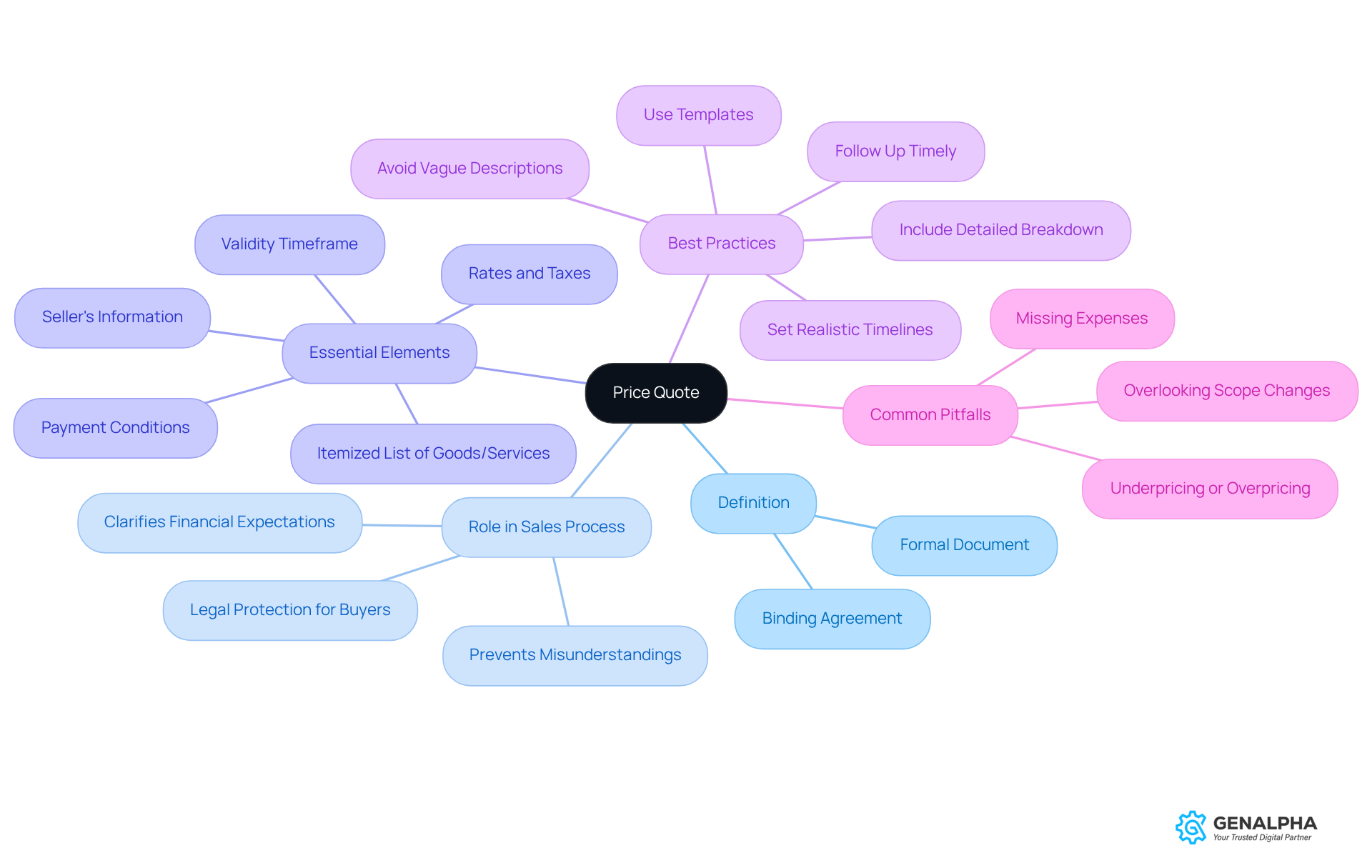
Contextualize Price Quotes: Importance in Manufacturing
In the manufacturing industry, knowing what is price quote plays a vital role in the sales process. They serve as a foundation for clarity and openness, helping to build trust between producers and their customers. Understanding what is a price quote involves recognizing that a goes beyond just listing costs; it also outlines delivery timelines, payment terms, and other important conditions. This comprehensive approach not only helps manage customer expectations but also reduces the chances of disputes over pricing later on.
Moreover, knowing what is price quote and providing accurate and timely quotes can significantly boost customer satisfaction—something that's crucial for securing repeat business and establishing long-term partnerships. For instance, manufacturers using automated pricing systems have reported finishing estimates 300% faster. This speed translates to enhanced responsiveness and increased customer confidence.
Additionally, companies that focus on providing precise estimates can minimize errors and respond more quickly, which enhances their chances of closing deals and ensuring smooth production operations. However, it's essential for manufacturers to understand what is price quote and keep it updated with market changes. Outdated estimates can lead to lost profits or missed sales opportunities.
Did you know that inaccuracies in data can cost manufacturing businesses up to 12% in lost revenue? This statistic highlights what is price quote and its financial importance for pricing accuracy. Ultimately, effective quoting practices not only streamline operations but also lay a solid foundation for lasting client relationships in the competitive manufacturing landscape. So, how are you ensuring your estimates are up-to-date and accurate?
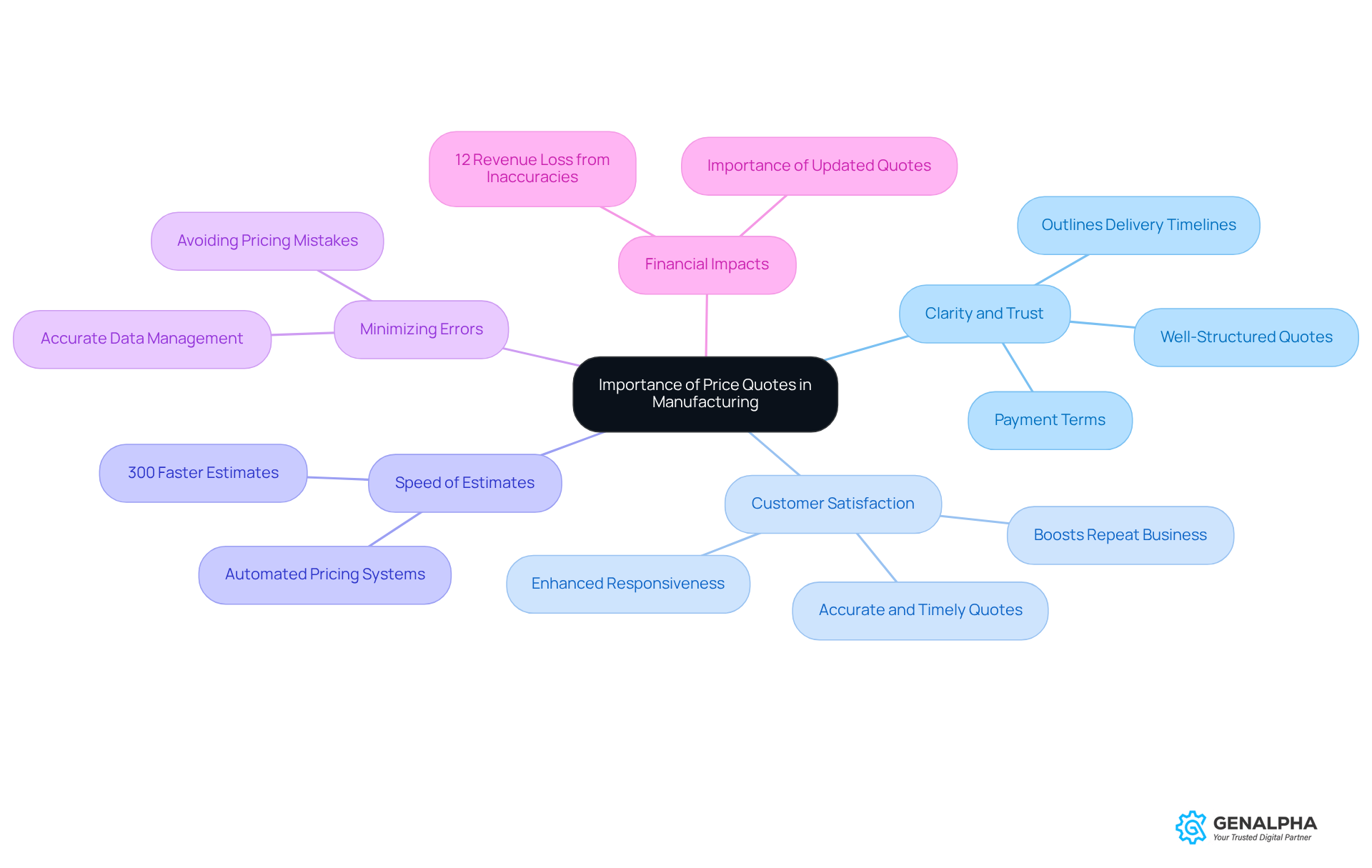
Trace the Evolution of Price Quotes: Historical Perspective
Have you ever thought about what is price quote and how much price estimation in manufacturing has changed over the years? It’s quite a journey—from informal verbal agreements based on trust to a structured, tech-savvy process that clarifies what is price quote. Initially, references were all about personal connections, but as competition ramped up, the need for formal documentation became crystal clear.
Now, with digital solutions stepping in, manufacturers can tap into automated pricing systems that quickly generate what is price quote estimates with impressive speed and accuracy. Today, integrates effortlessly with inventory and pricing systems, making sure that what is price quote reflects real-time data and market conditions. This shift not only boosts operational efficiency but also emphasizes what is price quote and how crucial it is for manufacturers to tweak their pricing strategies in a fast-paced market.
Recent stats show that the Cost Estimating and Quoting Software for Manufacturing Market, which was valued at USD 525.1 billion in 2023, is on track to hit USD 1,138.2 billion by 2031, with a CAGR of 11.56%. This growth is driven by a rising demand for efficiency, automation, and fewer mistakes in manufacturing processes. It’s clear that technology is becoming more essential to streamline estimating procedures and improve precision.
Experts like Jim Carr, President of CARR MACHINE & TOOL, point out that estimates are being completed 300% faster with advanced systems like ProShop. That’s a game-changer! Plus, understanding the importance of defining part details in the quoting process is key for accuracy. Capturing all the necessary information helps avoid costly errors. So, how are you adapting to these changes in your own estimating practices?
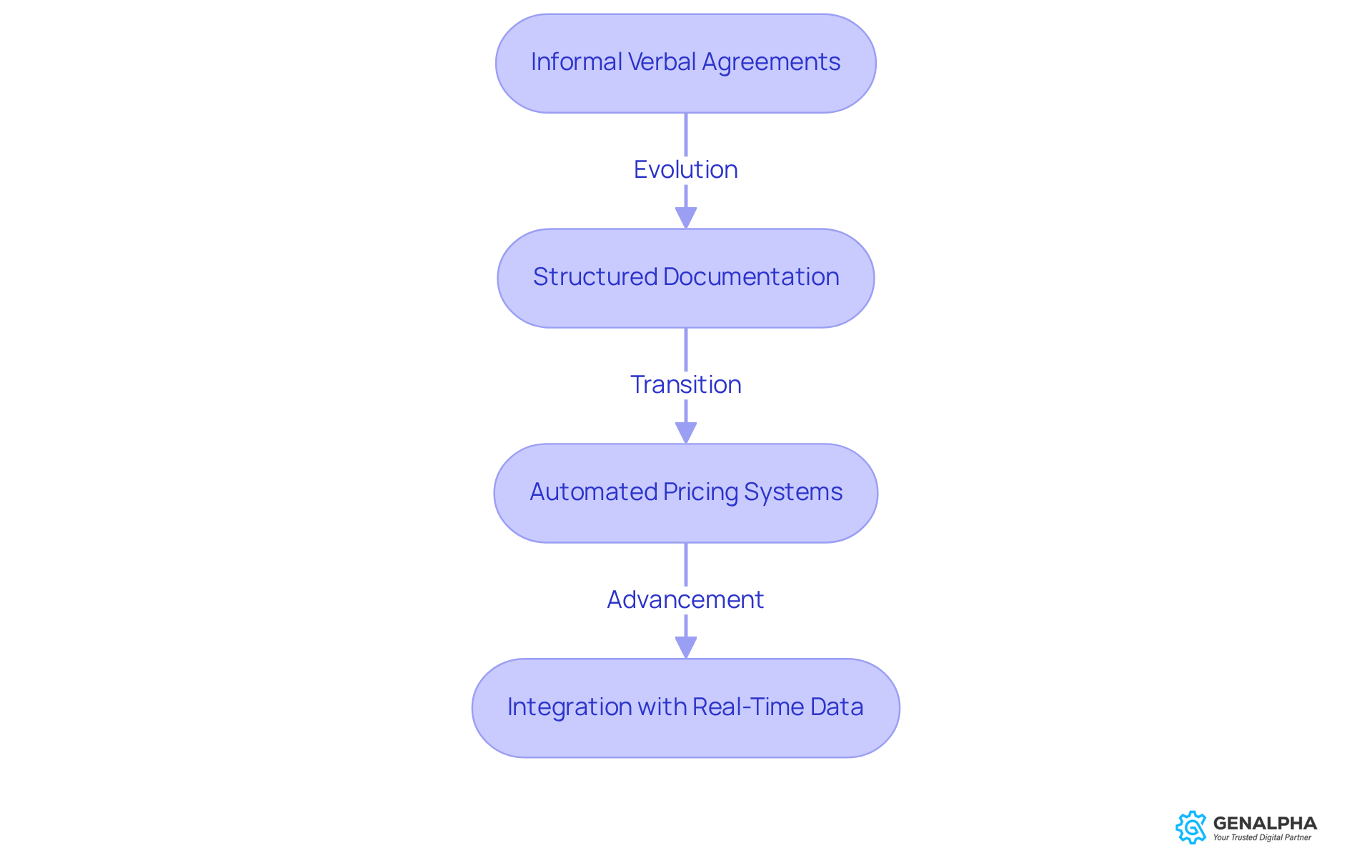
Identify Key Characteristics of Effective Price Quotes
Effective cost estimates come with some key traits that really boost their usefulness and impact. First off, clarity and conciseness are super important—steering clear of jargon helps buyers easily grasp the proposal. A well-organized estimate should provide clarity on what is price quote by breaking down costs in detail, clearly listing individual prices, taxes, and any extra charges. Plus, it's crucial to indicate how long the estimate is valid, as this keeps both parties informed about the acceptance timeframe, helping to avoid any misunderstandings.
Now, let’s talk about adding a personal touch. Including the customer's name and specific project details can create a sense of connection and trust, which is often a game-changer in closing deals. For instance, a graphic design studio that tailored its estimates to meet the unique needs of clients saw a noticeable boost in conversion rates. Additionally, making sure citations are easy to access and retrieve helps with quick references and follow-up discussions. This kind of accessibility not only but also reinforces professionalism, ultimately enhancing customer satisfaction and loyalty.
Moreover, having clear and transparent terms and conditions (T&Cs) helps customers understand what is a price quote, which is vital for building trust and minimizing misunderstandings. Automating the quoting process can also improve efficiency since outdated manual methods can slow down sales. And don’t forget—following up after sending proposals is essential for maintaining strong customer connections and increasing the chances of finalizing agreements.
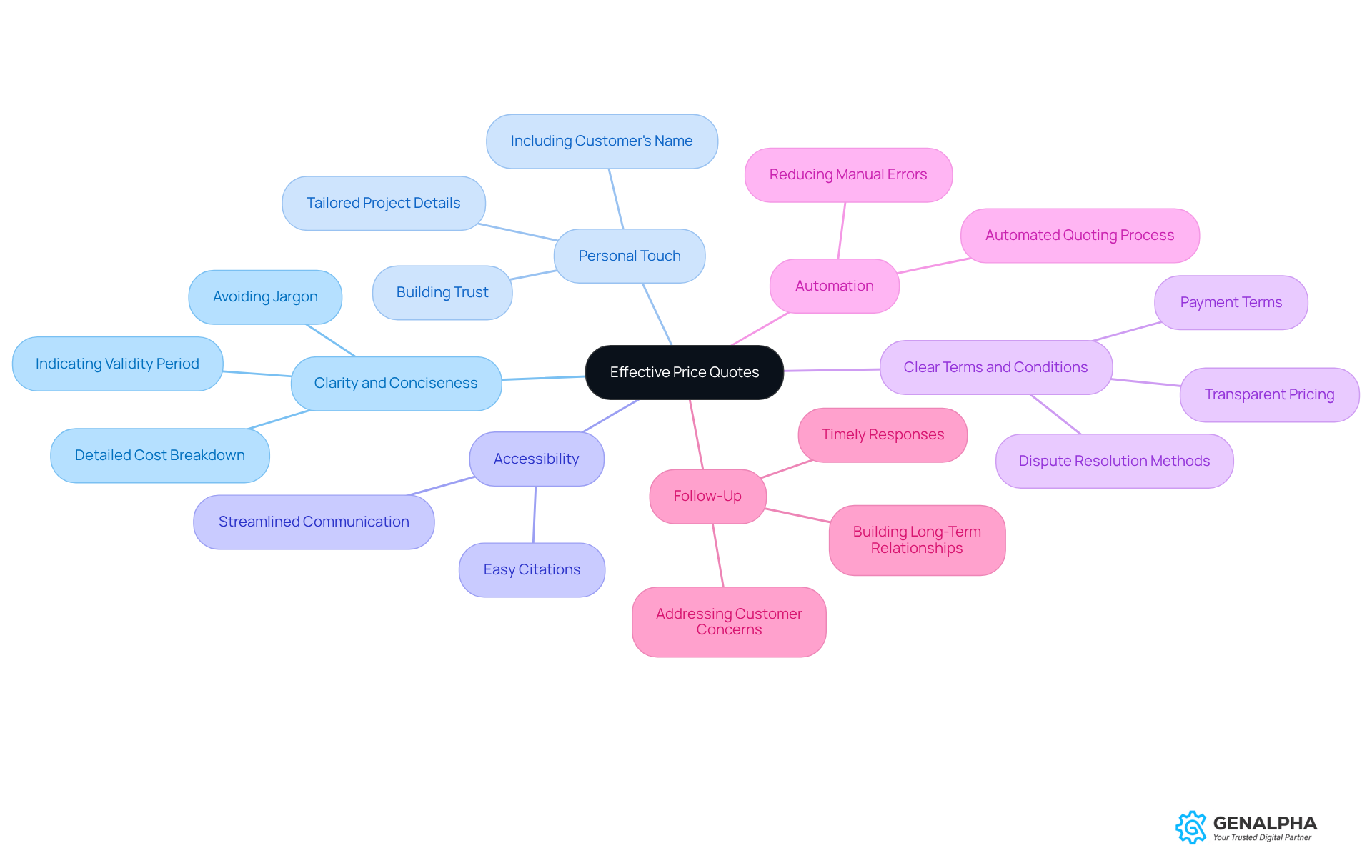
Challenges in Creating Accurate Price Quotes
Manufacturers often find it quite a challenge to understand what is price quote while generating precise cost estimates, right? The main culprits are the fluctuating material expenses and labor rates, which can swing dramatically based on market conditions. This unpredictability often raises questions about what is price quote, leading to figures that are either way too high—scaring off potential business—or too low, which can seriously eat into . For instance, if raw material costs vary, it can result in undercharging or overcharging, throwing off overall cost accuracy and shaking customer confidence.
And let’s not forget about the miscommunication that often happens between sales and production teams. This can lead to mismatches between what is price quote and actual costs, which makes the situation even trickier. So, how can manufacturers tackle these challenges effectively?
One solid approach is to adopt robust pricing systems that leverage real-time data. This way, pricing can reflect the current market landscape. Plus, implementing automated quoting solutions can really speed things up and ensure consistency, allowing for quicker responses to customer inquiries. It’s also vital to encourage collaboration among departments. Clear communication can significantly cut down on misunderstandings and enhance the accuracy of what is price quote. And let’s be honest—approval bottlenecks can frustrate customers who are eager to move forward, highlighting the need for more efficient systems.
Regular training for staff on best practices is crucial too. By empowering sales teams with in-depth product knowledge and clear pricing guidelines, they can provide more accurate estimates and foster better customer relationships. As expert Mattias Turovski points out, understanding what is price quote is essential for balancing competitive pricing with profitability through a well-structured quoting process. By focusing on these strategies, manufacturers can navigate the complexities of pricing variability and enhance their competitive edge in the market. Just think about it: data inaccuracies can cost manufacturing businesses up to 12% in lost revenue, which really underscores the financial stakes of inaccurate quotes!
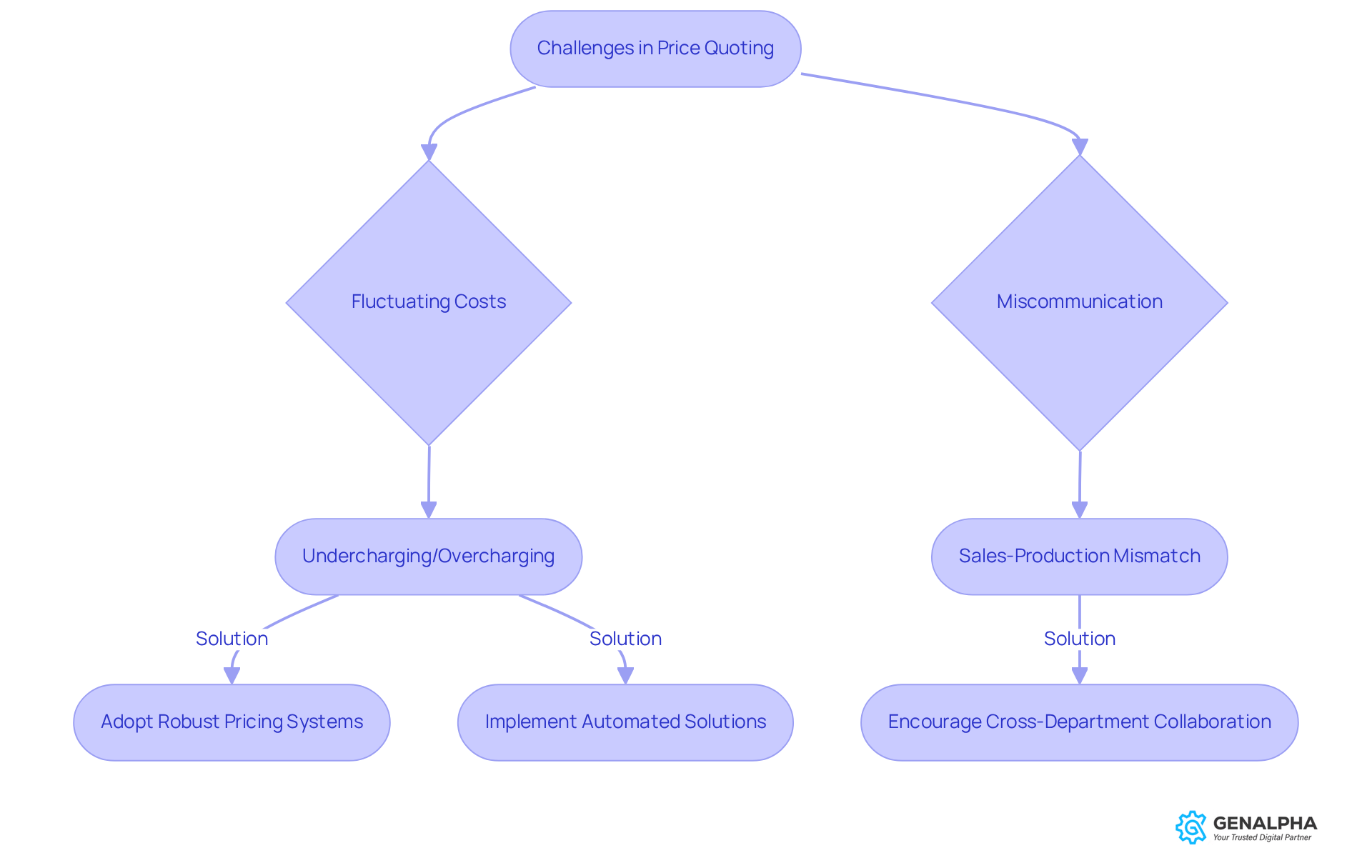
Conclusion
Understanding the intricacies of price quotes is crucial for manufacturers looking to navigate the sales process effectively. A well-crafted price quote does more than just outline costs; it builds transparency and trust between sellers and buyers. This clarity is vital in establishing solid relationships and minimizing potential disputes. It really highlights how important accurate and timely quotes are in the manufacturing sector.
Throughout this article, we've highlighted some key insights. We discussed the essential components of a price quote, the historical evolution of quoting practices, and the challenges manufacturers face in creating accurate estimates. We emphasized the significance of using structured templates, leveraging technology for efficiency, and maintaining clear communication across departments to boost accuracy and responsiveness. Remember, outdated or imprecise quotes can lead to significant financial losses. Staying updated with current market conditions is a must!
In conclusion, we can’t overstate the role of price quotes in manufacturing. They’re not just documents; they’re strategic tools that can greatly influence customer satisfaction and business success. We encourage manufacturers to embrace best practices in quoting, invest in advanced pricing systems, and prioritize ongoing staff training. This way, you can ensure your quoting processes are both efficient and effective. By doing so, you’ll secure a competitive edge in the market, foster lasting client relationships, and ultimately drive growth in your operations. So, let’s get started on improving those quoting practices today!
Frequently Asked Questions
What is a price quote?
A price quote, also known as a quotation, is a formal document provided by a seller to a potential buyer that details the specific expenses associated with goods or services. It typically includes pricing details, terms of sale, and the conditions under which the estimate is valid.
How does a price quote differ from a cost estimate?
A price quote is generally considered binding once the buyer approves it, while cost estimates can be more flexible. Price quotes serve as a clear communication tool in the sales process, helping both parties understand financial expectations.
What essential elements should a cost estimate document include?
A cost estimate should include the seller's name and contact information, a detailed itemized list of goods or services, rates, relevant taxes, payment conditions, and a validity timeframe for the estimate.
Why are cost estimates important in the manufacturing industry?
Cost estimates are crucial in manufacturing as they provide clarity and transparency, helping to build trust between producers and customers. They outline delivery timelines, payment terms, and other conditions, managing customer expectations and reducing pricing disputes.
How can accurate and timely quotes impact customer satisfaction?
Providing accurate and timely quotes can significantly boost customer satisfaction, which is essential for securing repeat business and establishing long-term partnerships. Faster estimates enhance responsiveness and increase customer confidence.
What are the benefits of using automated pricing systems for cost estimates?
Manufacturers using automated pricing systems can complete estimates 300% faster, leading to enhanced responsiveness and increased customer confidence.
What risks are associated with outdated price quotes?
Outdated price quotes can lead to lost profits or missed sales opportunities, as they may not reflect current market conditions.
How can inaccuracies in data affect manufacturing businesses?
Inaccuracies in data can cost manufacturing businesses up to 12% in lost revenue, highlighting the financial importance of pricing accuracy in quotes.
What common pitfalls should manufacturers avoid in cost estimations?
Manufacturers should avoid vague descriptions, missing expenses, and overlooking changes in scope to ensure effective communication and enhance their sales strategies.




